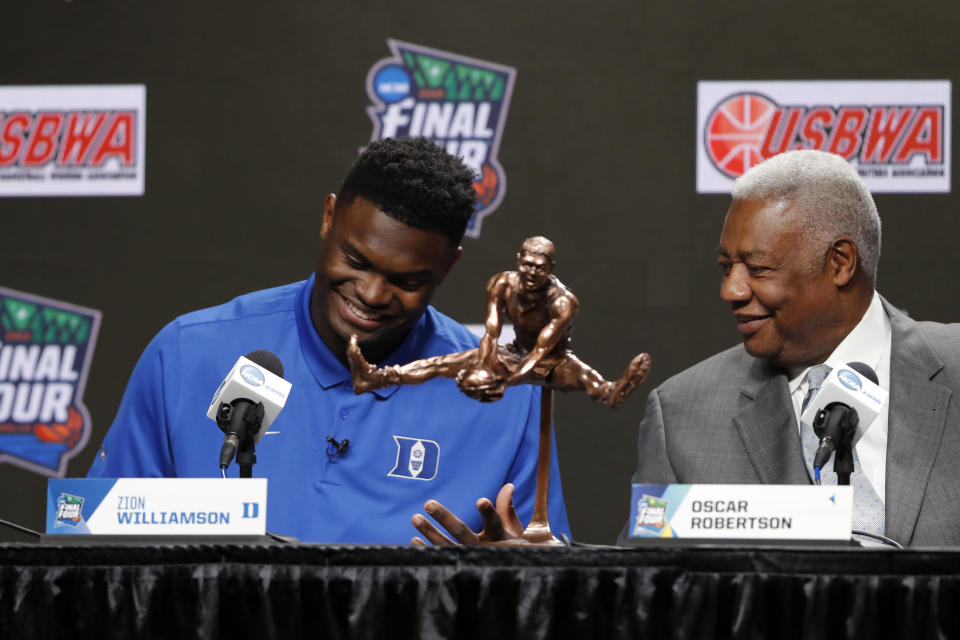NCAA ready to let college athletes get paid endorsements
The NCAA Board of Governors on Tuesday voted to allow college athletes to get paid for the use of their names, images, and likenesses; the move would usher in an economic sea change in college athletics.
The change is not yet official. For the moment, the board has directed the three NCAA divisions (DI, DII, DIII) to consider changing their rules, and to prepare for the changes by January 2021. That would be long before January 2023, when California’s SB206 or Fair Pay to Play Act, which California Gov. Gavin Newsom signed in September, is set to take effect.
California’s move to let college athletes in that state get paid endorsements is the clear catalyst in forcing the NCAA’s hand and spurring nationwide change; Newsom signed SB206 even after vociferous pushback from NCAA president Mark Emmert, who has long said that any compensation of college athletes would compromise the NCAA’s long-standing tenet of “amateurism.”
After the NCAA Board of Governors vote on Tuesday, board chairman Michael Drake, who is also president of The Ohio State University, said, “We must embrace change to provide the best possible experience for college athletes.”
In recent years, the super-stardom of select college athletes like Duke basketball player Zion Williamson, Oklahoma football player Baker Mayfield, and Texas A&M football player Johnny Manziel have repeatedly stoked the national debate over whether these young athletes should be free to earn money outside of college tuition. In 2009, former UCLA basketball player Ed O'Bannon led a class action lawsuit against the NCAA after he discovered his likeness in an EA Sports college basketball video game; that ultimately led EA to a $40 million settlement and to stop making college basketball and football video games. The news on Tuesday prompted some excitement at the possibility that EA could bring back those games.

Under NCAA amateurism rules, college stars have never been able to take outside money, including even a fee for signing autographs. If and when the new changes take effect, athletes would still not be allowed to accept money for their athletic performance—strictly for off-the-field (or off-the-court) endorsement opportunities.
But the way this change plays out will be far from simple, and it is unlikely to proceed smoothly at first. It is unclear how the NCAA and its member schools will regulate the endorsements, and how it will avoid ethical issues with recruitment.
“It’s going to open up new categories for the school and create new revenue for the players,” said George Pyne, the former Nascar COO and IMG president who now runs his own VC firm Bruin Sports Capital, on stage earlier this month at the Yahoo Finance All Markets Summit. “Where it gets tricky, I think, is the regulation of competition... From a recruiting standpoint, you know, if I'm a car dealer at Auburn, am I doing an endorsement to get that player or am I paying that player to come and play? I don't know. And what are the rules around that? I don't know how that works. It's easy for a politician to say, Hey, let's be more equitable to the players—which is fair. But how you do that without disrupting the whole industry is going to be interesting to watch.”
Jay Williams, the former Duke basketball star who shared the stage with Pyne at the Yahoo Finance Summit, concurred that regulating college athlete endorsements will be complicated, but said he supports the change.
“My last year in school, my jersey did around $2.3 million in sales,” Williams said. “When you return to these schools and you see that your jersey is still being sold, you wonder about, am I inclined to any kind of percent of revenue that's grossed on that? And how does that work? So I think yes, it will make things different... Now the content [on social media platforms] is actually getting younger and younger and younger, so I think you are going to see a lot of kids in high school start thinking about themselves as brands as well... I think the industry has already been disrupted, we're just now finding out about how it's been disrupted for a long time. A lot of that pay-for-play model has already existed for a very, very long time. And I just call that fair market value.”
And Justin Tuck, a former NFL star who played college football at Notre Dame, said about SB206 in a recent visit to Yahoo Finance, “The argument of ‘amateur status,’ that went out the window a long time ago. College athletes, I look at them as pro athletes now.”
—
—
Daniel Roberts is the sports business writer at Yahoo Finance. Follow him on Twitter at @readDanwrite.
Read more:
ESPN's Jay Williams: Why California's college athlete endorsement bill makes sense
Jay-Z defends his NFL deal: 'I think we have moved past kneeling'
Joe Tsai buying Nets could usher in new era of foreign money in US sports
Premier Lacrosse League has backing from NBC and Alibaba exec Joe Tsai
Jay Z will lead Puma’s return to basketball sneakers
Read the latest financial and business news from Yahoo Finance
Follow Yahoo Finance on Twitter, Facebook, Instagram, Flipboard, LinkedIn, YouTube, and reddit.
